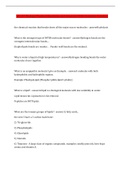MCAT Biology
MCAT Biology
All 24 results
Sort by
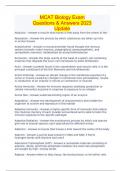
-
MCAT Biology Exam Questions & Answers 2023 Update
- Exam (elaborations) • 39 pages • 2023
- Available in package deal
-
- $21.49
- + learn more
MCAT Biology Exam Questions & Answers 2023 Update
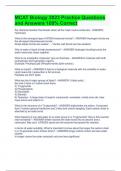
-
MCAT Biology 2023 Practice Questions and Answers 100% Correct
- Exam (elaborations) • 38 pages • 2023
-
- $12.99
- + learn more
the chemical reaction that breaks down all the major macro-molecules - ANSWER-Hydrolysis What is the strongest type of INTER-molecular bonds? - ANSWER-Hydrogen bonds are the strongest intermolecular bonds.... diople-dipole bonds are weaker. . . Vander wall bonds are the weakest. Why is water a liquid at high temperatures? - ANSWER-Hydrogen bonding bonds the water molocules closer together. What is an ampipathic molecule? give an Example. - ANSWER-A molecule with both hydrophobic and hy...
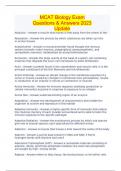
-
MCAT Biology Exam Questions & Answers 2023 Update
- Exam (elaborations) • 39 pages • 2023
- Available in package deal
-
- $19.99
- + learn more
MCAT Biology Exam Questions & Answers 2023 Update
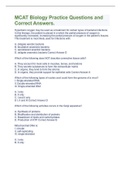
-
MCAT Biology Practice Questions and Correct Answers.
- Exam (elaborations) • 33 pages • 2023
-
- $8.99
- + learn more
Hyperbaric oxygen may be used as a treatment for certain types of bacterial infections. In this therapy, the patient is placed in a which the partial pressure of oxygen is significantly increased, increasing the partial pressure of oxygen in the patient's tissues. This treatment is most likely used for infections with: A. obligate aerobic bacteria B. facultative anaerobix bacteria C. aerotolerant anarobic bacteria D. obligate anaerobic bacteria Correct Answer D Which of the following ...
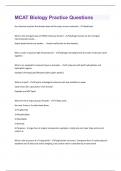
-
MCAT Biology | 480 Questions with 100% correct Answers | Verified
- Exam (elaborations) • 54 pages • 2023
- Available in package deal
-
- $13.49
- + learn more
the chemical reaction that breaks down all the major macro-molecules - Hydrolysis What is the strongest type of INTER-molecular bonds? - Hydrogen bonds are the strongest intermolecular bonds.... diople-dipole bonds are weaker. . . Vander wall bonds are the weakest. Why is water a liquid at high temperatures? - Hydrogen bonding bonds the water molocules closer together. What is an ampipathic molecule? give an Example. - A molecule with both hydrophobic and hydrophilic regions. Example: Ph...
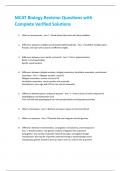
-
MCAT Biology Revision Questions with Complete Verified Solutions
- Exam (elaborations) • 31 pages • 2024
-
- $13.49
- + learn more
1. What are peroxisomes - Ans Break down fatty acids with beta-oxidation 2. Difference between stratified and pseudostratified epithelia - AnsStratified: multiple layers Pseudo: one layer with a bunch of different heights 3. Difference between cocci, bacilli, and spirilli - AnsCocci: sphere bacteria Bacilli: rod-shaped bather Spirilla: spiral bacteria 4. Difference between obligate aerobes, obligate anaerobes, facultative anaerobes, aerotolerant anaerobes - AnsObligate aerobes: need O2 ...
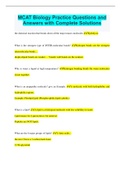
-
MCAT Biology Practice Questions and Answers with Complete Solutions
- Exam (elaborations) • 73 pages • 2022
- Available in package deal
-
- $12.49
- + learn more
MCAT Biology Practice Questions and Answers with Complete Solutions the chemical reaction that breaks down all the major macro-molecules Hydrolysis What is the strongest type of INTER-molecular bonds? Hydrogen bonds are the strongest intermolecular bonds.... diople-dipole bonds are weaker. . . Vander wall bonds are the weakest. Why is water a liquid at high temperatures? Hydrogen bonding bonds the water molocules closer together. What is an ampipathic molecule? give an Example. A molecule wit...
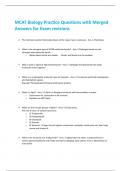
-
MCAT Biology Practice Questions with Merged Answers for Exam revisions
- Exam (elaborations) • 51 pages • 2024
-
- $14.49
- + learn more
The chemical reaction that breaks down all the major macro-molecules - AnsHydrolysis What is the strongest type of INTER-molecular bonds? - AnsHydrogen bonds are the strongest intermolecular bonds.... o dipole-dipole bonds are weaker. . . Vander wall bonds are the weakest. Why is water a liquid at high temperatures? - AnsHydrogen bonding bonds the water molecules closer together. What is an amphipathic molecule? give an Example. - AnsA molecule with both hydrophobic and hydrophilic...
MCAT Biology Practice Questions and Answers With Complete Solution...
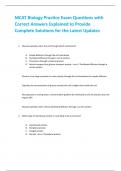
-
MCAT Biology Practice Exam Questions with Correct Answers Explained to Provide Complete Solutions for the Latest Updates
- Exam (elaborations) • 28 pages • 2024
-
- $13.49
- + learn more
1. Glucose typically enters the cell through which mechanism? A. Simple diffusion through the cell membrane B. Facilitated diffusion through a carrier protein C. Pinocytosis through a channel protein D. Active transport by a glucose transport protein - AnsFacilitated diffusion through a carrier protein Glucose is too large and polar to move quickly through the cell membrane by simple diffusion. Typically, the concentration of glucose outside the cell is higher than inside the cell. Sinc...

How did he do that? By selling his study resources on Stuvia. Try it yourself! Discover all about earning on Stuvia




